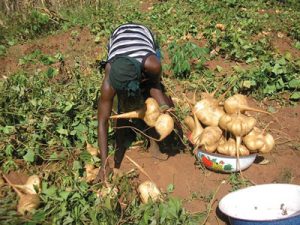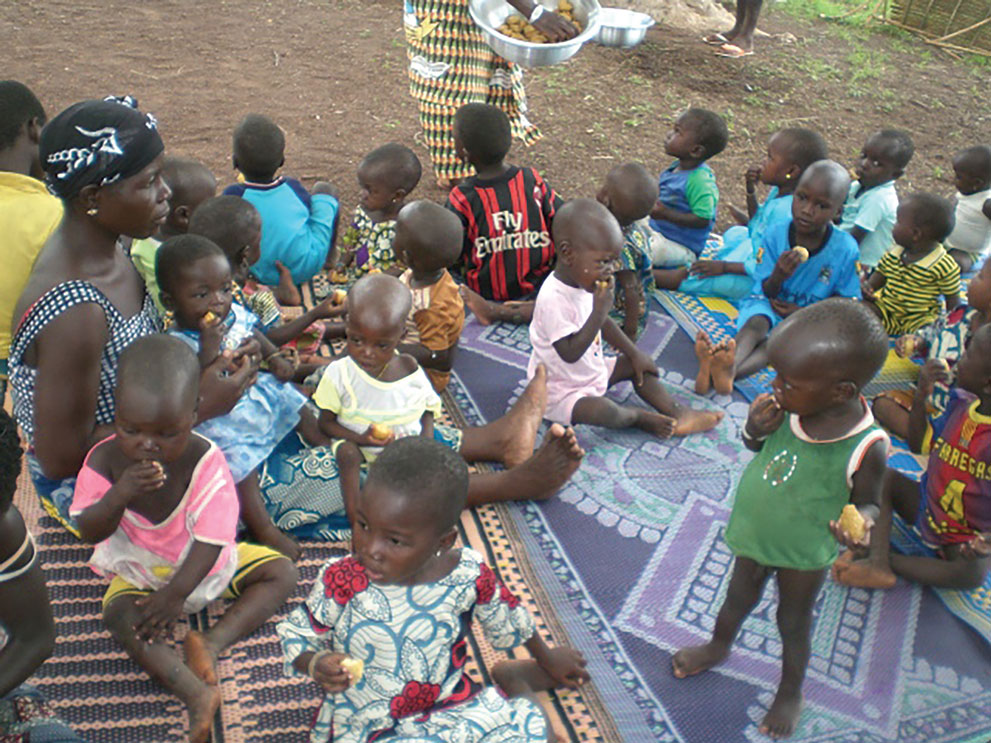Building an inclusive platform to help guide nutrition policy
Researchers and academics are more committed than ever in developing nutrition programs in an inclusive way, through participation in the National Council of Food and Nutrition (CAN) – a multi-sectoral, multi-stakeholder platform for improving nutrition. The fight against malnutrition has been a concern of successive governments of Benin for decades.
[vc_row row_type=”row” text_align=”left” css_animation=””][vc_column width=”1/2″]

Ségla Wilfrid Padonou, Researcher, Full member of the National Council of Food and Nutrition, representing research institutions.[/vc_column_text][/vc_column][/vc_row][vc_row row_type=”row” text_align=”left” css_animation=””][vc_column][vc_separator type=”transparent”][/vc_column][/vc_row][vc_row row_type=”row” text_align=”left” css_animation=””][vc_column]
[vc_separator type=”transparent” up=”10″ down=”10″][vc_column_text custom_options=””]Research and development improves nutrition and establishes the foundation for reliable community interventions. Nutrition deserves the attention of policy makers at the national, regional and local levels.
Joseph Dossou Hessou,
Coordinator of Core Nutrition Group, Benin
[/vc_column_text][/vc_column][/vc_row][vc_row row_type=”row” text_align=”left” css_animation=””][vc_column][vc_separator type=”transparent”][vc_column_text custom_options=””]Researchers and academics are more committed than ever in developing nutrition programs in an inclusive way, through participation in the National Council of Food and Nutrition (CAN) – a multi-sectoral, multi-stakeholder platform for improving nutrition.
The fight against malnutrition has been a concern of successive governments of Benin for decades. However, many initiatives since the 1960’s have suffered from a lack of harmonisation and clashes between stakeholders. Compounding this was the lack of coordination between the political sphere and academic and research actors. Government institutions responsible for nutrition planning and supply did not cooperate sufficiently with academic and research institutions. Therefore, support for researchers and academics was not continuous or centered on national priority areas.
As the general budget of the government does not cover a specific national research program for nutrition, research institutions moved toward the support of external donors to exist and function. Therefore, directions of research programs were not dictated by national priorities.
Another factor reducing the scope of the research (although conforming to the highest academic standards) was the discrepancy between the calendars of researchers and policymakers. To support their decisions, policy makers often need evidence on the spot. However, the compilation of evidence carried out by scientists and researchers naturally takes time – creating challenges with providing scientific evidence in time for effective decision making.
To meet these challenges, since 2007, Benin has undertaken political and economic reforms in the field of food and nutrition with the support of the World Bank. In 2011 this reform process led Benin to join the SUN Movement and establish the National Council for Food and Nutrition (Decree No. 2009-245 of 9 June 2009, adopted by the Council of Ministers). The institution is a multi-stakeholder platform (MSP), attached to the Presidency of the Republic, which brings together many different sectors involved in nutrition. Currently, the National Council of Food and Nutrition (CAN) is the center of decision making where nutrition research and the academic world have a prominent place.[/vc_column_text][vc_separator type=”normal”][vc_column_text custom_options=””]
CAN: An inclusive platform where scientists and academics help guide nutrition policy
With a Permanent Secretariat (PS), executive arm and interdepartmental subcommittees, CAN is responsible for:
- Defining the National Food and Nutrition Policy
- Developing, implementing, monitoring and evaluating the Strategic Development Plan for Food and Nutrition (PSDAN) and the National Program for Food and Nutrition focuses on the results (PANAR)
- Coordinating actions for improving food and nutrition security
The creation of CAN is the first success in fostering synergies between the policy and research environments in developing nutrition programs. This MSP allows:
- policymakers to directly inform researchers of their data needs
- researchers to participate in the identification of the most appropriate responses to national nutrition problems
- researchers to produce evidence that addresses these national priorities and needs
- direct delivery of results to the relevant ministries
- researchers to engage directly with government officials to obtain the necessary financing to generate data
- researchers to obtain scientific results and then translate them into concrete recommendations as a basis for policy documents and public policy.
Within CAN, academics and researchers help identify research topics on nutrition, develop national or regional survey protocols, validate and compile the results obtained, develop publications (such as the food guide of Benin -a ranking of foods adapted to the urban environment and availability of local food culture) and organise capacity building activities in academic institutions.
A concrete example of the culmination of the political and scientific collaboration to improve decision-making based on nutrition facts, has been the emphasis placed on systematic reviews of the literature on nutrition.[/vc_column_text][vc_column_text custom_options=””]
Systematic nutrition literature reviews

These reviews, organised nationally, are made available to CAN for political decision-making. The review currently in progress aims to identify relevant nutrition interventions that can significantly reduce the high prevalence of stunting in children over 2 years of age in Benin.
In December 2015, the first part of the course reviewing nutrition literature to inform policy will commence for researchers, academics, PhD students and staff of key institutions. This course will be organised by the FINSA (International Training in Nutrition and Food Science of the School of Nutrition and Food Sciences, University of Abomey – Calavi) and will be integrated into conventional training provided by FINSA.

CAN also engage with the EVIDENT partnership, a global network of North-South partners aiming to enhance evidence-informed decision-making and policy driven research in health and nutrition. This engagement will further support CAN to strengthen the link between policy makers and researchers and identify the most appropriate responses to current nutritional problems, based on the existing evidence.
[/vc_column_text][/vc_column][/vc_row][vc_row row_type=”row” text_align=”left” css_animation=””][vc_column][vc_separator type=”transparent”][/vc_column][/vc_row][vc_row row_type=”row” text_align=”left” css_animation=””][vc_column width=”1/2″][vc_column_text custom_options=””]
Challenges
Since its inception, the fundamental challenge of CAN has been mobilising financial resources from government authorities. Politicians from the community level to the highest levels of government, tend to design development programs with significant infrastructure. The CAN has a responsibility to advocate and position nutrition at the heart of the national development agenda and ensure effective engagement of policy makers for sufficient investment in nutrition.
Since 2013, through its advocacy efforts, CAN has managed to secure a small specific budget line for nutrition as part of the state budget. Complimenting this, CAN is working to support the integration of a subsidy program into municipal development plans. In light of this, the National Association of Municipalities of Benin and the National Commission of Local Finance – which controls the Support Fund to the Municipalities development – are mobilised.[/vc_column_text][/vc_column][vc_column width=”1/2″]
Key Lessons
- Research programs should be determined by national priorities
- For this, policy makers and researchers need to agree on how to communicate their needs:
- First, policymakers must continuously express their data needs.
- On the other hand, researchers must present the results of their work in a form that can guide recommendations and policy guidelines.
- The allocation of resources for the production of evidence must be decided jointly by policy makers and scientists.
- Decision-making based on context specific evidence will guarantee success in the fight against malnutrition.
 [/vc_column_text][/vc_column][/vc_row]
[/vc_column_text][/vc_column][/vc_row]